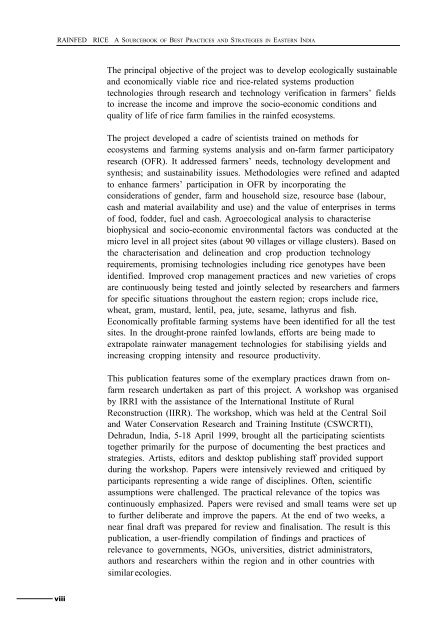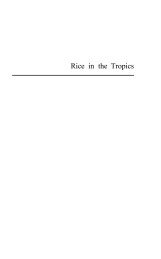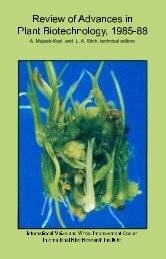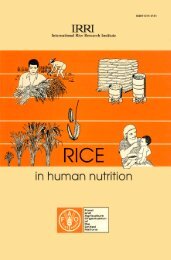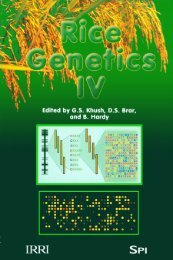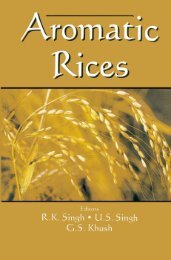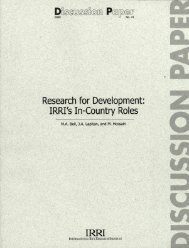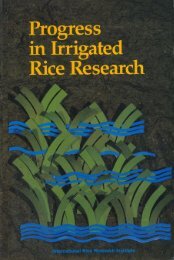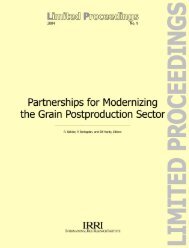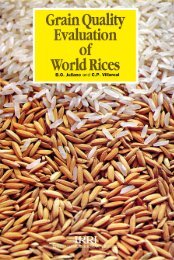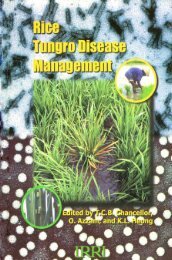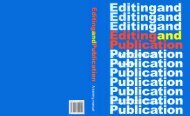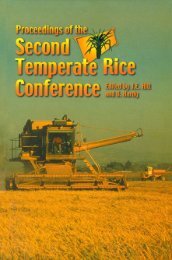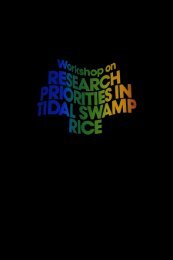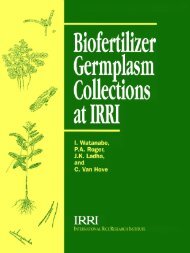Rainfed rice - IRRI books - International Rice Research Institute
Rainfed rice - IRRI books - International Rice Research Institute
Rainfed rice - IRRI books - International Rice Research Institute
Create successful ePaper yourself
Turn your PDF publications into a flip-book with our unique Google optimized e-Paper software.
RAINFED RICE A SOURCEBOOK OF BEST PRACTICES AND STRATEGIES IN EASTERN INDIA<br />
viii<br />
The principal objective of the project was to develop ecologically sustainable<br />
and economically viable <strong>rice</strong> and <strong>rice</strong>-related systems production<br />
technologies through research and technology verification in farmers’ fields<br />
to increase the income and improve the socio-economic conditions and<br />
quality of life of <strong>rice</strong> farm families in the rainfed ecosystems.<br />
The project developed a cadre of scientists trained on methods for<br />
ecosystems and farming systems analysis and on-farm farmer participatory<br />
research (OFR). It addressed farmers’ needs, technology development and<br />
synthesis; and sustainability issues. Methodologies were refined and adapted<br />
to enhance farmers’ participation in OFR by incorporating the<br />
considerations of gender, farm and household size, resource base (labour,<br />
cash and material availability and use) and the value of enterprises in terms<br />
of food, fodder, fuel and cash. Agroecological analysis to characterise<br />
biophysical and socio-economic environmental factors was conducted at the<br />
micro level in all project sites (about 90 villages or village clusters). Based on<br />
the characterisation and delineation and crop production technology<br />
requirements, promising technologies including <strong>rice</strong> genotypes have been<br />
identified. Improved crop management practices and new varieties of crops<br />
are continuously being tested and jointly selected by researchers and farmers<br />
for specific situations throughout the eastern region; crops include <strong>rice</strong>,<br />
wheat, gram, mustard, lentil, pea, jute, sesame, lathyrus and fish.<br />
Economically profitable farming systems have been identified for all the test<br />
sites. In the drought-prone rainfed lowlands, efforts are being made to<br />
extrapolate rainwater management technologies for stabilising yields and<br />
increasing cropping intensity and resource productivity.<br />
This publication features some of the exemplary practices drawn from on-<br />
farm research undertaken as part of this project. A workshop was organised<br />
by <strong>IRRI</strong> with the assistance of the <strong>International</strong> <strong>Institute</strong> of Rural<br />
Reconstruction (IIRR). The workshop, which was held at the Central Soil<br />
and Water Conservation <strong>Research</strong> and Training <strong>Institute</strong> (CSWCRTI),<br />
Dehradun, India, 5-18 April 1999, brought all the participating scientists<br />
together primarily for the purpose of documenting the best practices and<br />
strategies. Artists, editors and desktop publishing staff provided support<br />
during the workshop. Papers were intensively reviewed and critiqued by<br />
participants representing a wide range of disciplines. Often, scientific<br />
assumptions were challenged. The practical relevance of the topics was<br />
continuously emphasized. Papers were revised and small teams were set up<br />
to further deliberate and improve the papers. At the end of two weeks, a<br />
near final draft was prepared for review and finalisation. The result is this<br />
publication, a user-friendly compilation of findings and practices of<br />
relevance to governments, NGOs, universities, district administrators,<br />
authors and researchers within the region and in other countries with<br />
similar ecologies.


